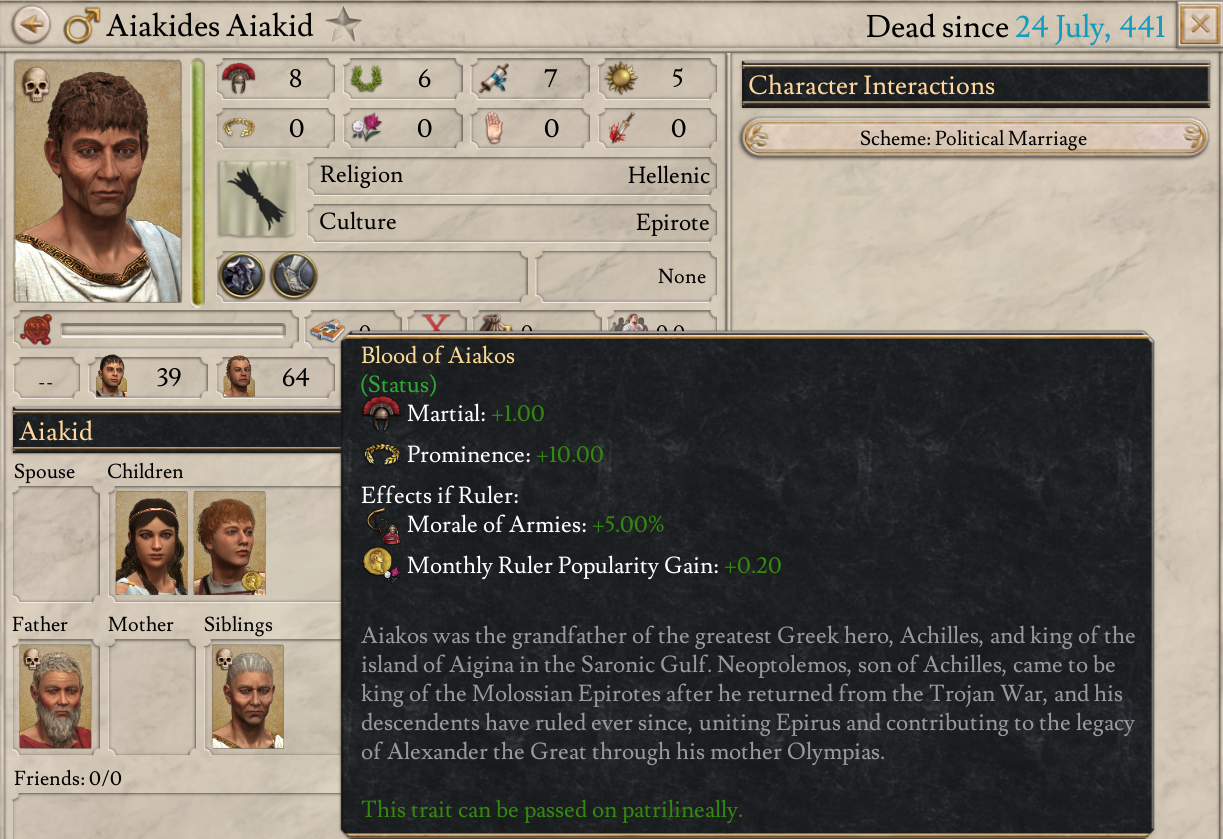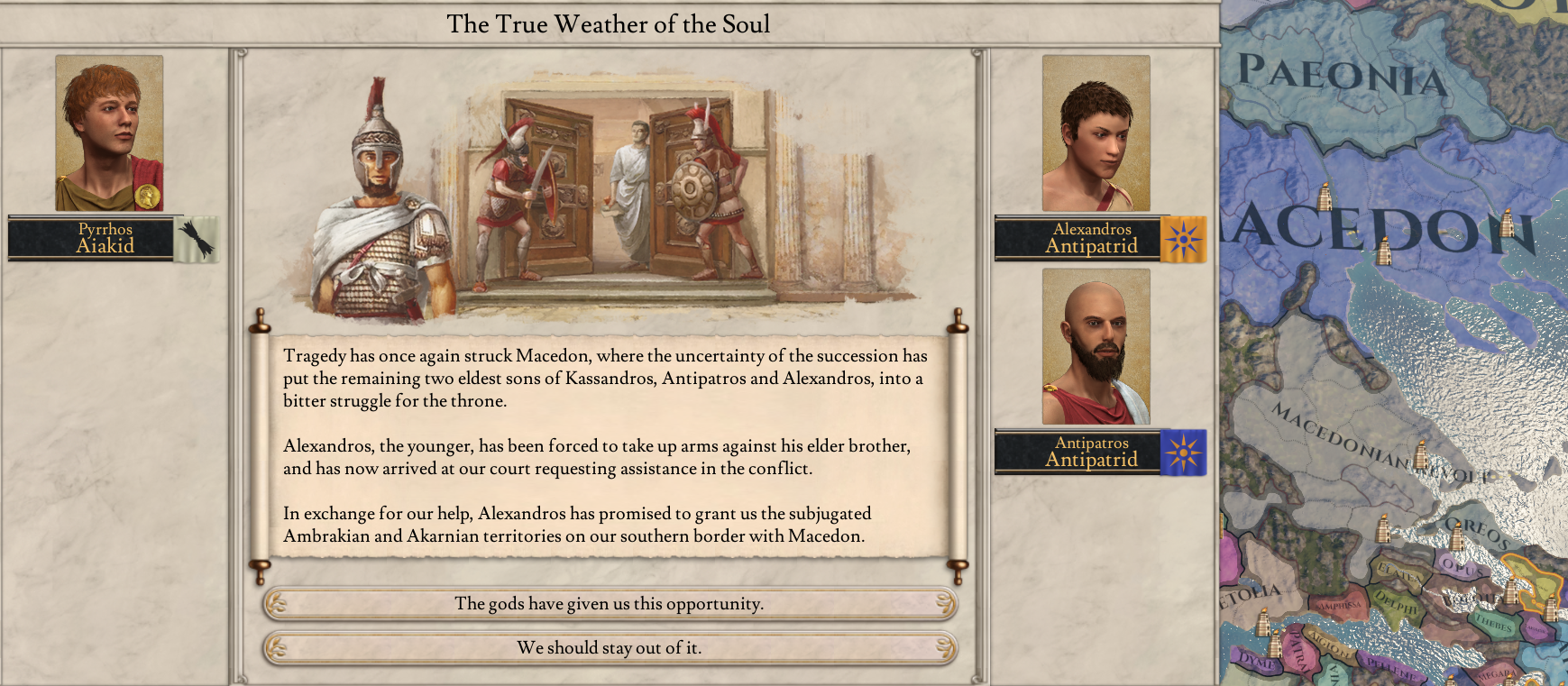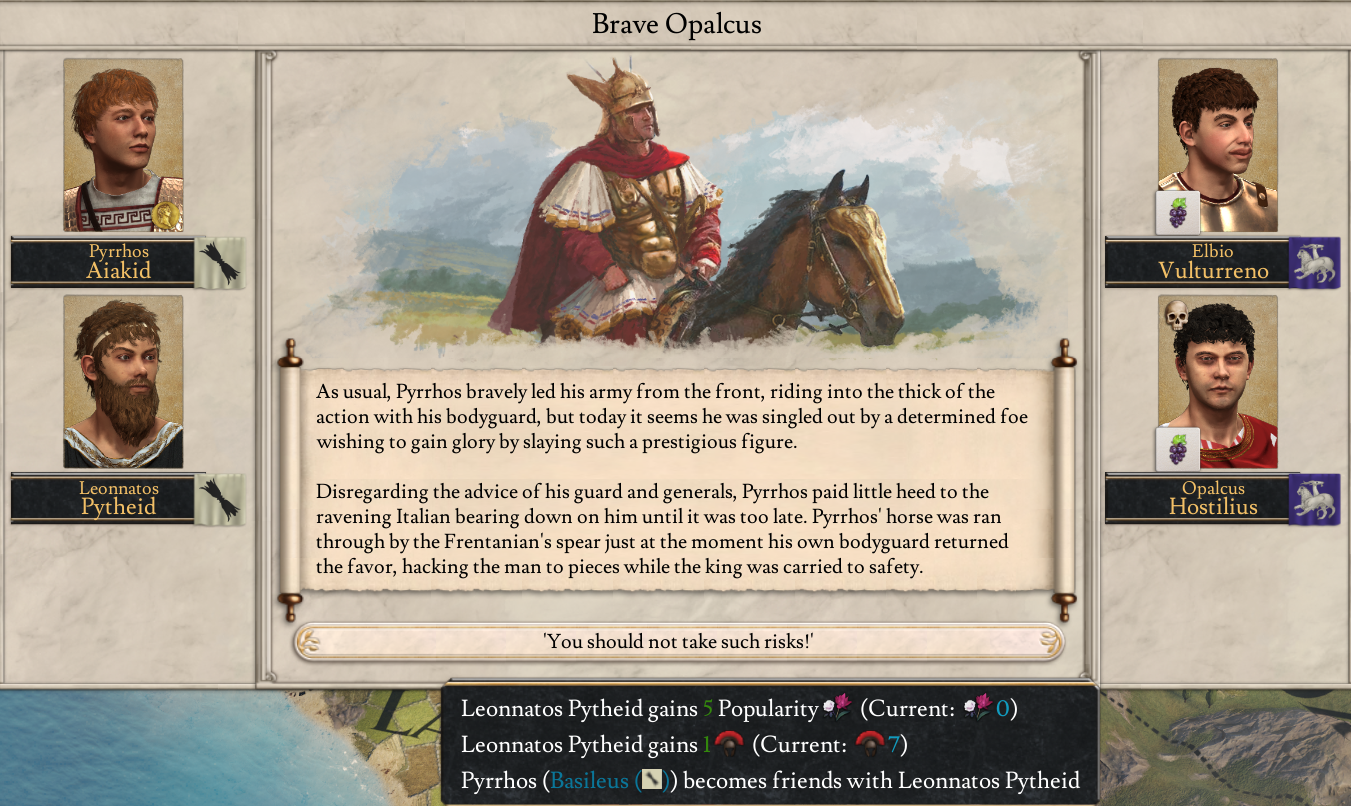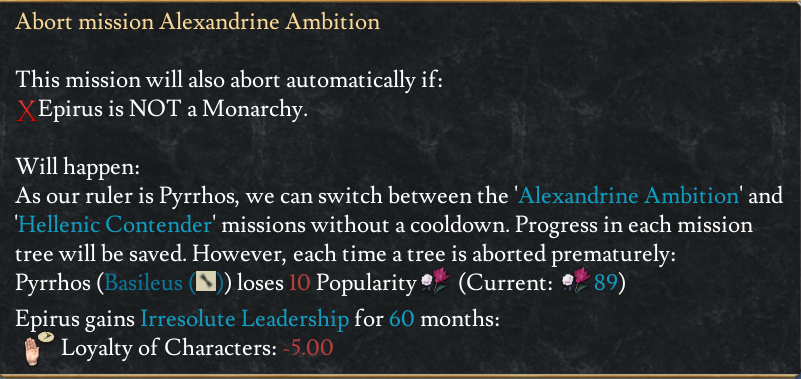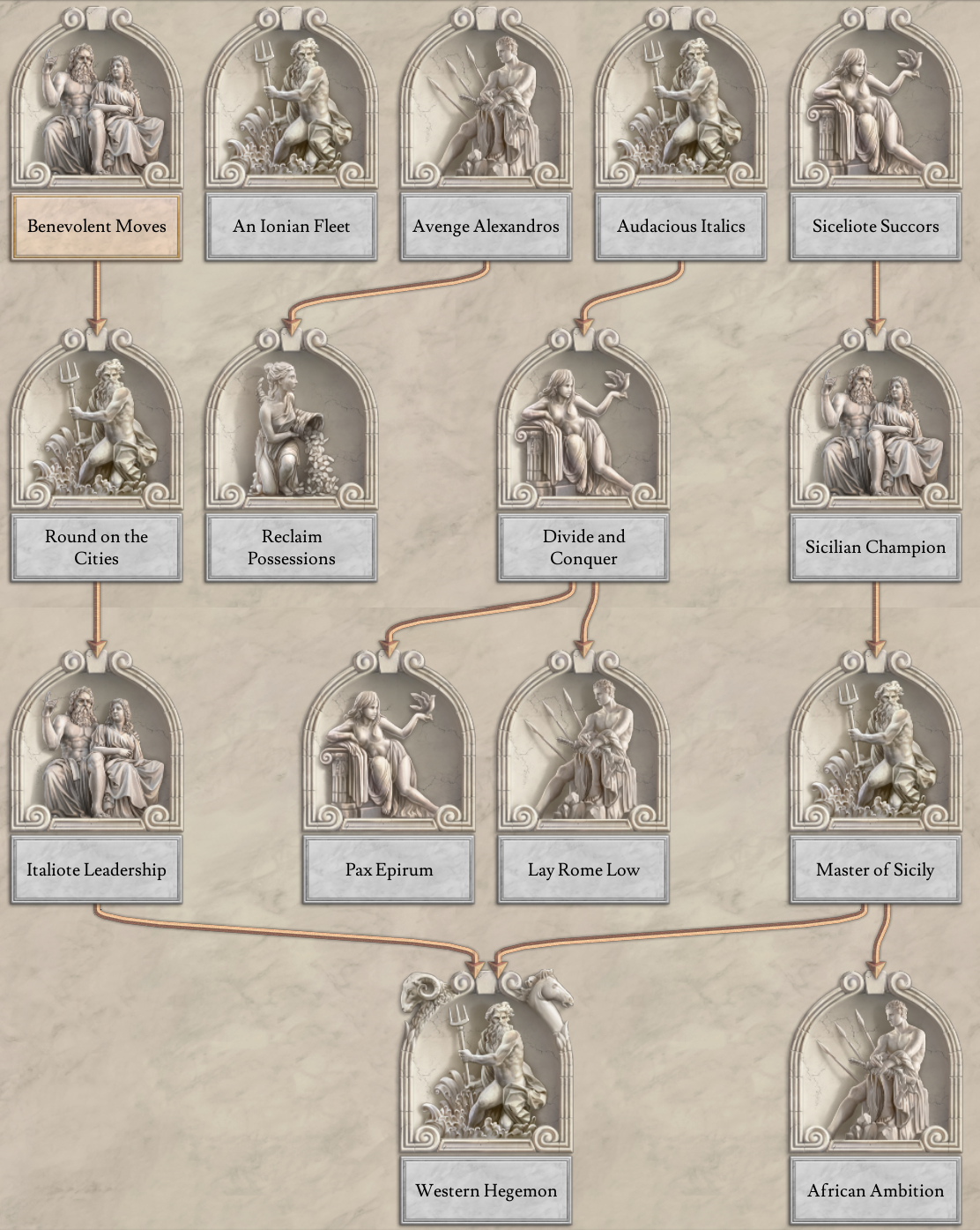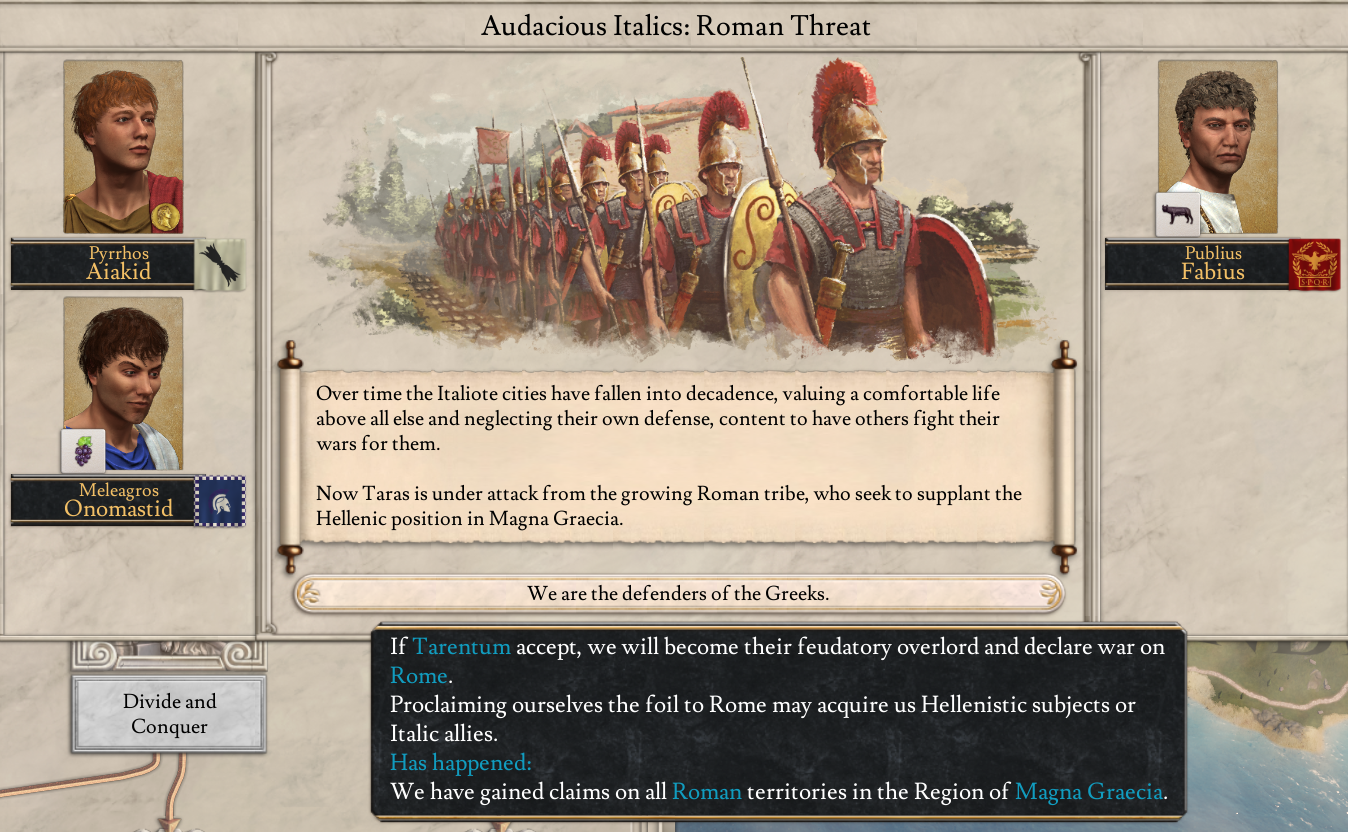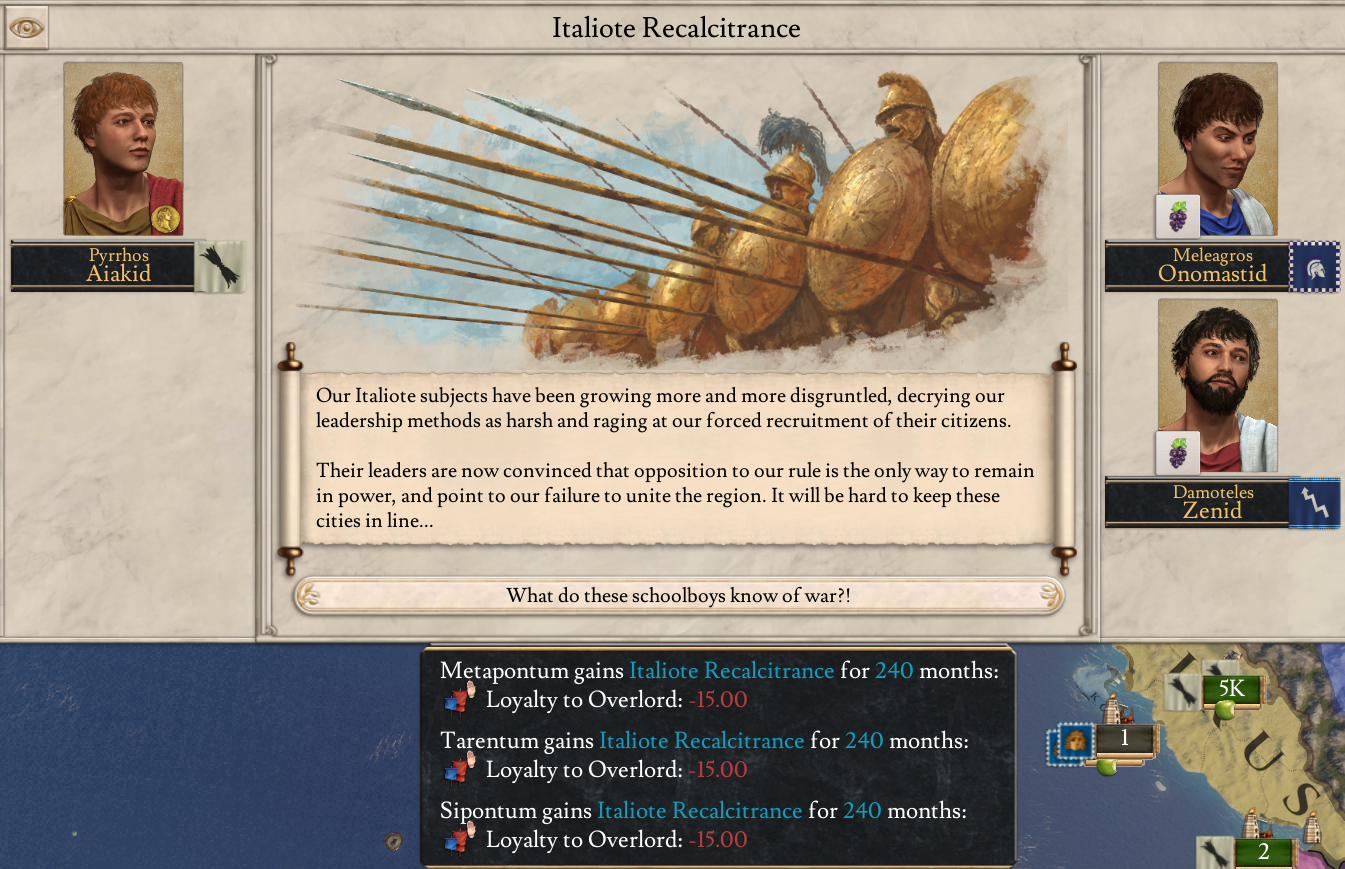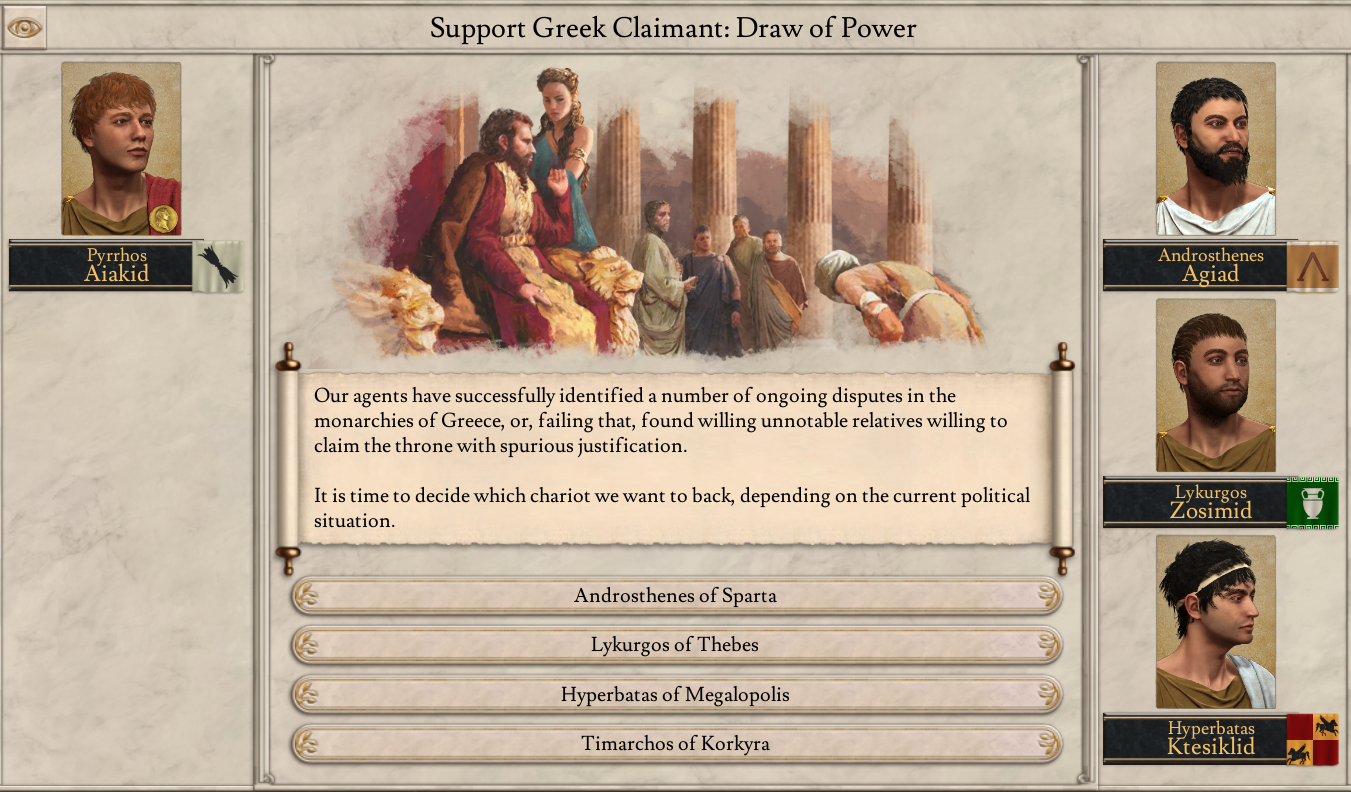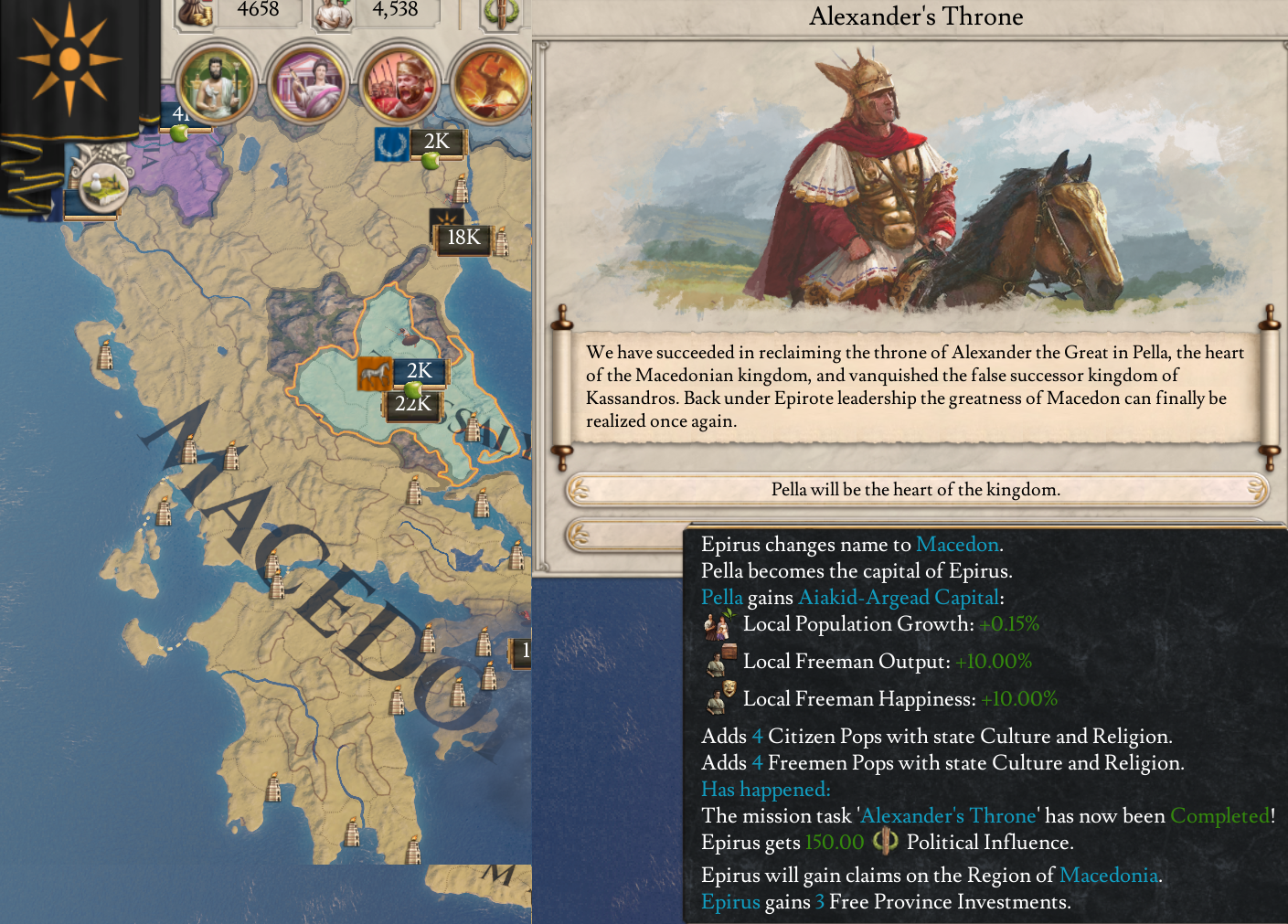Greetings fellow Epirotes, I hope you're ready for a long be-screenshotted dev diary.
That's right, today I will be talking a little (!) about the three new mission trees included in the re-release of the Epirus Pre-Order Pack, and the history that inspired them. ‘Only three?’ I hear you say? Fear not, they are chock-full of flavor and tasks.
The decades preceding our start date were rather turbulent for Epirus, with the two main branches of the ruling Aeacid dynasty - supposedly direct descendents of the hero Achilles and named for his grandfather Aeacus - fighting each other for the throne, and being picked off by wars in Italy and Macedon.
Pyrrhus was himself forced to flee to neighboring Taulantia as an infant when his father Aeacides was deposed by the dominant Molossian tribe - under encouragement from Cassander in Macedon - who installed Aeacides’ older brother Alcetas II in his place along with a Macedonian governor. While his son was living in exile, Aeacides was killed fighting the forces of Cassander in support of the claims of his ill-fated cousin Olympias’ descendants.
Molossian Consolidation
By 304 BC, Pyrrhus had been re-installed on the throne by the Taulantian king, Glaukias, after Alcetas II was deposed and killed (you may see a trend developing). His main rival is his second cousin Neoptolemus who is arguably a more deserving claimant, being the son of Alexander I of Epirus and daughter of Cleopatra of Macedon - Alexander the Great's only full sibling - thereby making him both an Argead and an Aeacid.
Historically, Pyrrhus was deposed once again and replaced by Neoptolemus in an event chain which owners of the pre-order DLC will already be familiar with, sending him to the diadochi courts where he seeks support for his claim on Epirus’ throne. Historically, he went to the Antigonids - as Demetrius Poliorcetes had recently married his sister Deidamia - and fought with their military, before ending up in the Ptolemaic court as part of hostage negotiations after the battle of Issus.
The new missions allow you to organize a royal marriage with any of the successor kingdoms, thereby guiding which court Pyrrhus flees to if he is deposed and thus the marriage and support he may acquire while away.
The old event arranging an Antigonid-Aeacid marriage will still fire as usual for non-DLC owners.
Pyrrhus’ return to Epirus works much as before, though some new events will detail the continued rivalry between Neoptolemus - or whoever is the most eligible pretender - and Pyrrhus, leading to a violent resolution and the ascendance of the favoured prince.
The first mission tree, 'Molossian Consolidation', is centered around the politics, development, and minor expansions of the realm under Neoptolemus and earlier on in Pyrrhus’ time on the throne. The king-making power of the Molossians will need to be checked by the new monarch, and there are plenty of opportunities for expanding the pantheon, developing Epirus' core territories, and deciding how to deal with your northern, western, and southern neighbors.
As the eagle-eyed have already spotted, Epirus no longer owns Ambrakia from the start, which is now an OPM and tributary of Macedon alongside Akarnia - other victims of Cassander’s garrisons. But you need not fret, Epirus is no weaker than it was before, and there will be an opportunity to claim the territory without bloodshed as your campaign develops.
The above is part of one of a number of free minor DHEs (dynamic historical events) coming with the 1.5 patch to add a bit more historical flavor to Macedon and the fraught Antipatrids. There are also a few extra flavor events for Pyrrhus outside of the missions that feature some of the events of his life and those who affected it, which can have some ahistoric outcomes.
Alexandrine Ambition
Now, Pyrrhus is of course most famous for his campaigns in Italy, inspired by those of his cousin Alexander I of Epirus who died fighting the Bruttians and Lucanians and was himself attempting to emulate his nephew Alexander the Great’s eastern conquests in the west. However, Pyrrhus was famously akratic, changing his objectives on a whim and pursuing many simultaneous opportunities. To reflect this, Epirus will be able change between the two other mission trees - ‘Alexandrine Ambition’ and ‘Hellenic Contender’ - without a cooldown or loss of progress while Pyrrhus is their ruler, though at a cost to the court's confidence in their leader.
The 'Alexandrine Ambition' mission tree offers opportunities to involve yourself in the wars of Magna Graecia by aiding the Greek city states against Italic aggressors, seek revenge for the defeats of your dynasty, and perhaps even achieve glorious victory over the Romans and Carthaginians - thereby cementing your position as the hegemon of the west.
Historically, Pyrrhus used his reputation as a great warrior, the threat of the Italic and Punic powers, and the renowned skills of his diplomat Cineas to win over the Greek city states and be appointed to lead their forces. This tree will allow you to gain Italiote and Siceliote subjects and alliances in a similar manner, though - as Pyrrhus found - failing to live up to your ambitions in a timely manner may undermine your diplomatic efforts.
In seeking dominance over Magna Graecia Epirus will undoubtedly come into conflict with one of the nascent Italian powers, be it Rome or some other, and may attempt to negotiate a truce, an offer the Romans famously turned down after the condemnation of the Appius Claudius Caecus, or simply triumph over the barbarians as Pyrrhus so Pyrrhicly failed to do.
It will be possible to create two large vassals - one in Magna Graecia and one is Sicily - once dominance is achieved in either. Of course this is optional, and Epirus may wish to rule the region more directly.
All of these tasks will acquire their targets dynamically and do not depend on the survival of any specific tags, e.g. Rome.
Of course historically, Pyrrhus failed to hold on to his holdings in Greece despite a wide coalition of Greeks and Italics aiding against him the Romans, and he ultimately gave up his holdings in the face of defeat and turned his attention to Macedon and Greece with his characteristic determined impatience.
Hellenic Contender
As relatives of Alexander the Great, the Aeacidae may attempt to claim the throne of Macedon and supplant the northerners as the hegemons of Greece - using the argument that the Macedonians greatest conqueror owed his qualities to his Epirote mother as much as his Argead father.
The pursuit of power over Greece will call for the removal of foreign and diadochi overlords, the subjugation of the Aetolians, and total dominance over the old city states.
Epirus may attempt, as Pyrrhus did historically with Lysimachus of Thrace, to form a pact of expedience with one of the diadochi against Macedon, and thereby surround them on both sides.
Epirus will be able to liberate the subjugated Thessalians - whose general Menon of Pharsalus was the father of Pyrrhus’ mother Phthia and fell fighting Polyperchon and Antipater for the Thessalians freedom after Alexander the Great’s death - thereby making use of their famed cavalry as his companions.
The Aeacidae may also turn the shrine of Achilles at Troy into a major cult center by taking control of the city, thereby bringing the hero of the Iliad and the dynasty into Epirus’ state pantheon.
Ultimately, Pyrrhus was killed after a campaign in Greece that began with an invasion of Sparta by which he sought to install a puppet claimant on their throne - a gambit which Epirus can attempt against any monarchy in Greece - for which the Spartan defence is remembered for its bravery in the face of overwhelming odds.
Most importantly, there are two new loading screen quotes related to Pyrrhus, so keep your eyes peeled come release day!
Despite his ultimate defeat and death during his siege of Argos, Pyrrhus' exploits had a great impact on the world, only narrowly being cheated out of the dominion of Magna Graecia and Macedon by fortune and the fates. With a little more prudence, Pyrrhus - legendary even in defeat - can outshine even the glory of Alexander.
That’s all from me, and I hope you enjoy the Epirus content!
































